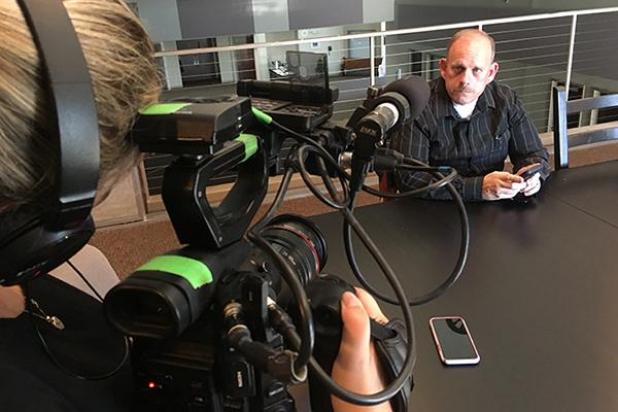
Holyoke Police Sgt. Mark Werts is pictured during the filming of Investigation Discovery’s special on the 2009 murder of Mike Rust. As a Saguache County sheriff’s deputy, Werts participated in the multiagency investigation of Rust’s disappearance, which in 2017 ended in the conviction of Charles Moises Gonzales. — The Holyoke Enterprise | Johnson Publications
Mark Werts to star in Discovery special on former cold case homicide
In 2017, the FBI reported that more than one-third of all homicide cases remain open. Though the likelihood of solving these cases varies from community to community, that means present-day killers still have a surprisingly large chance of getting away with murder.
When renowned mountain biker Mike Rust disappeared near his Saguache County home 10 years ago, it looked like investigators — including then-Saguache County sheriff’s deputy Mark Werts — might never learn the identity of his killer.
But that all changed in 2015, when Charles Moises Gonzales was betrayed by his son, leading to his conviction on multiple counts related to Rust’s murder.
The life sentence later handed down to Gonzales vindicated close to nine years of scraping and searching for Werts and his fellow investigators. For Rust’s family, it was the end of a waking nightmare.
Now, Investigation Discovery’s “Murder in the Heartland” series aims to tell the story of Rust’s murder and the break in the case that led to Gonzales’ conviction.
Werts is among several people interviewed in the episode, which will air Sunday, June 9, at 7 p.m. MT on Investigation Discovery.
Werts helped take down Saguache County killer in 2017
On Werts’ desk at the Holyoke Police Department, a single metal rose sits among stacks of notebooks and papers.
It was one of many such flowers made by Rust, whose interest in crafts made from scrap metal and bicycle parts was well-known. In fact, a bicycle-sprocket belt buckle helped Rust’s family identify his remains when his gravesite was finally discovered in 2016.
Werts said he’s had the rose since the early days of the investigation. Today, it serves as a reminder of how hard work and follow-up can crack cases like Rust’s murder.
“I keep this in my office as a way of showing that with perseverance and continually looking into things, cases can be solved,” he said. “And this case was solved, and there’s somebody in prison for it. He’s spending life in prison for this murder.”
On the night of March 31, 2009, Rust’s girlfriend received a call from the Mountain Bike Hall of Fame inductee, who reported that his home had been broken into and a revolver stolen. Rust said he’d found tracks leading into the woods and was going to follow them.
The call turned out to be his last. A day passed with no word from Rust, and on April 2, his brother contacted the sheriff’s office to report him missing.
Werts said the investigation began as a search and rescue operation, and crews from various agencies started by combing the area around Rust’s house for evidence. On April 4, a K-9 team came across a blood-stained vest and a broken pistol grip. The blood was later tested and confirmed to be Rust’s.
Still, in the absence of a body, Werts said investigators hadn’t ruled out the possibility of Rust crashing his motorbike, which he had apparently used to pursue the thieves, in the woods.
Werts said he conducted dozens of interviews and met with Rust’s friends and family while investigators continued to search for the bike. In early May, it was found at the bottom of an embankment, along with evidence suggesting it had been dumped recently.
“At that point, I started considering it as a homicide investigation. We knew something bad had happened,” Werts said.
Investigators struggled to find additional clues to Rust’s fate as leads petered out and the months dragged on. Gonzales had become a person of interest by September due to his involvement in a string of local burglaries, but law enforcement failed to find evidence conclusively linking him to Rust’s disappearance.
Werts left the department not long afterward but said the case continued to trouble him.
“I always kept the rose around, and I had met with the family on a regular basis while we were working on this,” Werts said. “His mother was just devastated about it. And then she ended up passing away before this guy was taken into custody, so she never got closure while the rest of the family eventually did.”
Finally, in 2015, investigators got a break when Gonzales’ son, Michael, approached the sheriff’s office claiming to have information about Rust’s disappearance. He said he and other family members had dug a hole supposedly to be used for an underground clubhouse on his grandfather’s property. But Michael became suspicious when the hole was later filled with tires and garbage.
Gonzales was in prison on unrelated charges when authorities excavated the hole and found human remains that were later identified as Rust’s. When later interviewed by state police, Gonzales claimed to have killed Rust in self-defense.
Werts was contacted by a former coworker when the case broke and learned that the Colorado Bureau of Investigation had gotten involved.
“I was truly excited about it,” he said. “I was thrilled.”
Werts was called to testify during the trial and said the district attorney called him immediately afterward to tell him that Gonzales had been convicted. He was found guilty of first-degree murder, abuse of a corpse, tampering or destroying evidence, burglary and theft, and was sentenced to life in prison.
Werts said Rust’s family thanked him after the trial for his support and help in putting Gonzales away.
“It was a tough case. It was a door that had been left open, and that was really frustrating for me,” Werts said.
“I was just happy that they were finally able to bury their family member and get closure after all of that.”
